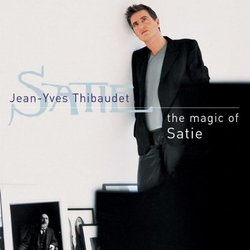| All Artists: Thibaudet, Satie Title: The Magic of Satie Members Wishing: 0 Total Copies: 0 Label: Decca Release Date: 9/10/2002 Genre: Classical Styles: Chamber Music, Historical Periods, Classical (c.1770-1830) Number of Discs: 1 SwapaCD Credits: 1 UPC: 028947029021 |
Search - Thibaudet, Satie :: The Magic of Satie
 | Thibaudet, Satie The Magic of Satie Genre: Classical
Don't judge this splendid disc by its silly title. Jean-Yves Thibaudet has put together an imaginatively programmed and gorgeously played Erik Satie recital that is certain to acquire reference status alongside the classic... more » |
Larger Image |
CD DetailsSynopsis
Amazon.com Don't judge this splendid disc by its silly title. Jean-Yves Thibaudet has put together an imaginatively programmed and gorgeously played Erik Satie recital that is certain to acquire reference status alongside the classic Satie recordings by Aldo Ciccolini, his one-time mentor. The difference lies in Decca's far superior sonics, and Thibaudet's warmer, more robust piano sonority. He imbues the music with subtle dynamic gradations and varied articulations that keep Satie's sparse textures vibrant and fresh, without any of the posturing and willfully slow tempi favored by several Satie specialists. Thibaudet cleverly separates the three famous Gymnopédies and intersperses them between brooding works like the Gnossiennes, upbeat, dry-witted selections ("Jack in the Box" and "La Belle Excentrique," along with some fascinating world premieres). And it's refreshing to hear the cabaret song "Je Te Veux" so seamlessly phrased, as if vocal chords had temporarily replaced the piano's hammers. Simply a joy. --Jed Distler Similarly Requested CDs
|
CD ReviewsQuite... simply...a joy! A Reader | La Jolla, CA United States | 01/08/2003 (5 out of 5 stars) "Extraordinary, eloquent, intimate and impassioned performances. Each time I listen, I get taken deeper into Satie, yes, but also into *music* itself. Satie's music is really meant for the performer (note his comments on the score), intimately.I also think Satie used it as map & vehicle rather than as destination. (I used to refer to - and prefer - Aldo Ciccolini while reading the score. Thibaudet has provided a whole new landscape to fit the map.)Although Satie said his music should be performed "so that no-one listens to it," I think he was actually trying to get to us in the same way that admonishing someone to not think about elephants has the opposite effect.Thibaudet's interpretations are a joy to listen to, to pay attention to. (And I thought I knew Satie...!) Whether taken as seriously as a mating dance, or as playful as one, there is a profound sense of intimacy here.If your impression of Satie is that he wrote "furniture music" long before Muzak - sounds to provide a background while you eat or chat or have drinks, or shop at Nordstroms - then this recording may reawaken you. Thiba breathes new life into Satie, new levels: it seems to take one into deeper realms of consciousness, toward thoughtless contemplation.(And I learned that "'Gnossienne' refers to the 'Crane Dance' performed in the labyrinth of the palace of Knossos [Gnossos] in ancient Crete." ...Now, is that provocative?)" Genius Hippie Smell | Brooklyn | 12/15/2002 (5 out of 5 stars) "I heard Yves on NPR talking about Satie and this album. Satie was a very eccentric genius, that wrote short little stories along with the notes in his music. When I heard Yves reading one of these stories along with the musical composition I was blown away. I realized that this was an artist that can breathe life into his music. This is very minimalistic music that is deceptively complex. My favorite part about this disk is how much feeling and expression is in each song. I recommend this to anyone that loves classical piano." Maybe the best... oknrt | �stanbul, Turkey | 12/25/2002 (5 out of 5 stars) "This album offers both first time recordings and a high quality, warm sound that may help you to feel Satie's free-from-tricks music. As it says in the booklet, you don't need to be a virtuoso to play Satie but you have to understand the certian state of mind. The Magic of Satie is probably the best choice for both old and new Satie listeners."
|

 Track Listings (32) - Disc #1
Track Listings (32) - Disc #1